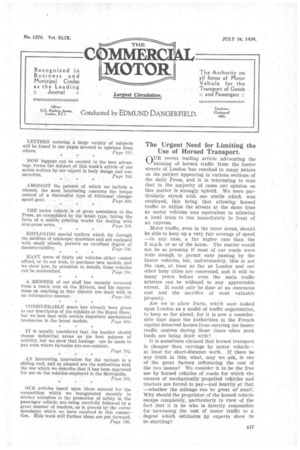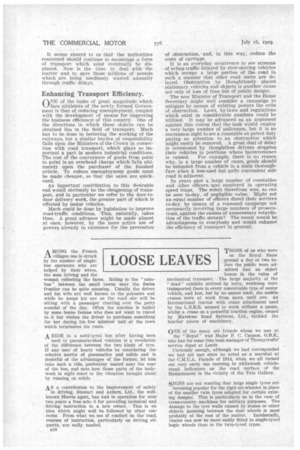The Urgent Need for Limiting the Use of Horsed Transport.
Page 43

Page 44

If you've noticed an error in this article please click here to report it so we can fix it.
OUR recent leading article advocating the banning of horsed traffic from the busier street of London has resulted in many letters on the subject appearing in various sections of the daily Press, and it is interesting to note that in the majority of eases our opinion on this matter is strongly upheld. We were particularly struck with one simile which was employed, this being that allowing horsed traffic to utilize the streets at the dame time as motor• vehicles was equivalent to allowing a local train to run immediately in front of an express.
Motor traffic, even in the inner areas, should be able to keep up a very fair average of speed —in any 'case, a far, higher rate than the 3 m.p.h. or so of the horse. The matter would not be so pressing if most of our roads were wide enough, to permit easy passing by the faster vehicles, but, unfortunately, this is not the case, at least so far as London and our other busy cities are concerned, and it will he many years before even the main traffic arteries can be widened to any appreciable extent. It could only be done at an enormous cost and the sacrifice of most valuable property. Are we to allow Paris, which once looked upon London as a model of traffic organization, to keep so far ahead, for it is now a considerable time since the authorities in the French capital debarred horses from entering the busier traffic centres during those times when peak loads are being dealt with? It is sometimes claimed that horsed transport is cheaper than carriage by motor vehicle-at least for short-distance work. If there be any truth in this, what, may we ask, is one of the great factors influencing the cost of the two means? We consider it to be the free use by horsed vehicles of roads for which the owners of mechanically propelled vehicles and tractors are forced to pay—and heavily at that —whether the mileage run be great or small. Why should the proprietor of the horsed vehicle escape completely, particularly in view of the fact that it is he who is directly responsible fox increasing the cost of motor traffic to a degree which estimates by experts show to be startling? It seems absurd to us that the authorities concerned should continue to encourage a form of transport which must eventually be displaced. Now is the time to deal with the .matter and to save those millions of pounds which are being needlessly wasted annually through traffic delays.
Enhancing Transport Efficiency.
ONE of the tasks of great magnitude which face ministers of the newly formed Governinent is that of reducing unemployment, Coupled with the development of means for improving the business efficiency. of this country. One of the directions in which these objects can he obtained lies in the field of transport. Much has to be done in bettering the working of the railways, but a similar burden 9f responsibility falls upon the Ministers of the Crown in connection with road transport, which plays so important a part in modern industrial conditions. The cost of the conveyance of goods from point to point is an overhead charge which falls ultimately upon the purchaser of the finished article. To reduce unemployment goods must be made cheaper, so that the sales are quickened.
An important contribution to this desirable end would obviously be the cheapening of transport, and in particular we refer to the door-todoor delivery work, the greater part of which is effected by motor vehicles.
Much could be done by legislation to improve road-traffic conditions. This, naturally, takes time. A great advance might be made almost at once, however, by the more active use of powers already in existence for the prevention
of -obstruction,' and, in this way, r reduce the costs of carriage.
It is an everyday occurrence to see streams of urban traffic delayed by slow-moving vehicles which occupy a large portion of the road in such a manner that other road users are delayed. Obstruction by thoughtlessly placed stationary vehicles and objects is another cause not only of loss of time but of public danger: The new Minister of Transport and the Horne Secretary might well consider a campaign to mitigate by means of existing powers the evils of obstruction. Laws, by-laws and regulations which exist in considerable numbers could be utilized.' It may be advanced as an argument against this course that the task would employ a very large number of policemen, but it is no uncommon sight to see a constable on patrol duty paying no attention to an obstruction which might easily be removed. A great deal of delay Is occasioned by thoughtless drivers stopping. their vehicles in positions where inconvenience is caused. For example, there is no reason why, in a large number of cases, goods should be unloaded from a vehicle in a Main thoroughfare when a less-used but quite convenient side road is adjacent.
In years past a_ large number of constables and other officers. as employed in operating speed traps. The reStilt therefrom was, as can be seen to-day, of negligible value. Might not an equal number of officers direct their services to-day, by Means of a reasoned campaign not necessarily involving large numbers of prosecution, against the causes of unnecessary retardation of the traffic stream? The result would be advantageous to everybody and would enhance the efficiency of transport in general:




















































































































